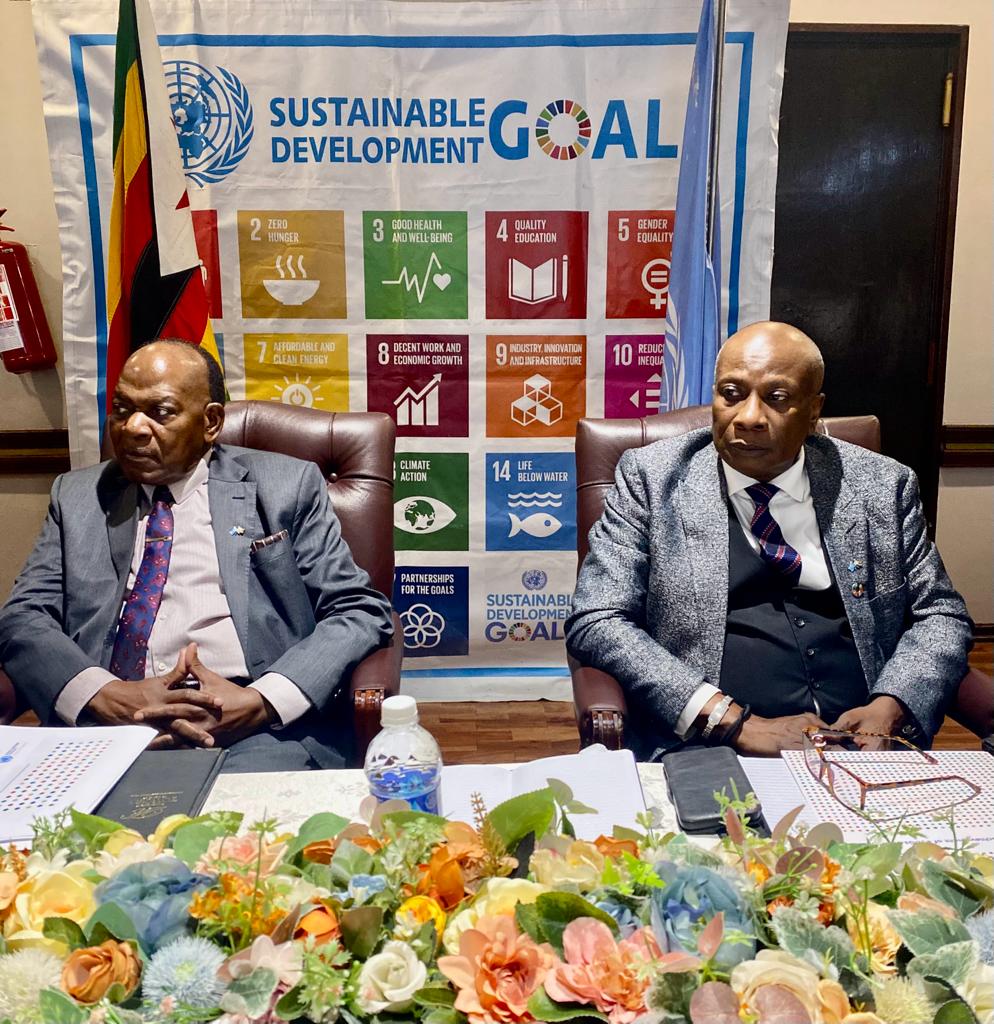|
Getting your Trinity Audio player ready...
|
The 2022-2026 Zimbabwe UN Sustainable Development Cooperation Framework (ZUNSDCF) Steering Committee and stakeholders convened jointly by the Chief Secretary to the President and Cabinet, Dr Misheck JM Sibanda and the UN Resident and Humanitarian Coordinator Mr Edward Kallon reviewed development results in 2022 and endorsed plans for 2023.
The ZUNSDCF, delivering US$524 million in various forms of projects and programmes in 2022, has made deliberate initiatives to target populations often left furthest behind and these include persons with disabilities, migrants and refugees, children, youths, and rural farmers among others under four strategic areas agreed with the Government of Zimbabwe namely:
- People–centred equitable, human development and well-being.
- Environment protection, climatic resilience, and natural resource management.
- Economic Transformation, equitable and inclusion growth; and
- Accountable, equitable and inclusive governance.
Noting that in 2022 the United Nations prioritized social protection, resilience building, provision of quality social services, gender equality, and democratic and economic governance, UN Resident and Humanitarian Coordinator Mr Edward Kallon said, “Without the generous support of the donor community, the development results could not have been achieved and I would like to thank the donor community in Zimbabwe, who supported the first year of implementing the ZUNSDCF with an estimated US$ 544 million”.
The Steering Committee and stakeholders meeting brought together over 100 senior representatives from the Government, Development Partners, Civil Society, Private Sector, Youth Groups, Women’s movement, Organizations of Persons with Disabilities, and the media.
Addressing the meeting, Chief Secretary to President and Cabinet said, “The ZUNSDCF is consistent with the collective aspirations and determination of the people of Zimbabwe to achieve an empowered and prosperous upper middle-income society by 2030 as enunciated by His Excellency, President Dr Emmerson D. Mnangagwa and attaining the global aspirations of the transformation and universally accepted Sustainable Development Goals.”
The Government of Zimbabwe and the United Nations have a shared commitment to leaving no one behind through delivering concrete results that ensure inclusive participation and reach the people typically left behind the furthest. Noting that the UN Country Team in Zimbabwe shares this vision and is taking active steps to implement it through the Cooperation Framework, Dr Misheck JM Sibanda said, “We all work together to accelerate development progress during the Decade of Action as we work to recover better and stronger from the impact of the COVID 19 pandemic”.
The High-Level Joint Steering Committee meeting allowed stakeholders to review and assess existing strategies under the ZUNSDCF and agreed to focus in 2023 on:
- Creating an enabling environment that promotes (i) human development, (ii) climate resilience, natural resources management and sustainable food systems, and (iii) economic transformation, and equitable and inclusive growth.
- Addressing structural challenges related to extreme poverty, exclusion, corruption, discrimination, adherence to the rule of law, and violation of human rights.
- Strengthening government and partners’ capacities at national and sub-national levels to plan and deliver transparently and accountable quality, evidence-based and equitable basic public goods and services, implement climate change mitigation and adaptation interventions and build long-term resilience, especially for the furthest left behind.
- Empowering communities, especially the most vulnerable and the furthest behind, to demand their rights and meet their responsibilities and promote dialogue and citizen engagement.
The ZUNSDCF with a five-year programme cycle until 2026 and fully aligned to the National Development Strategy One has a development finance portfolio of US$2.8 billion to be mobilized in support of national development priorities and SDGs.






